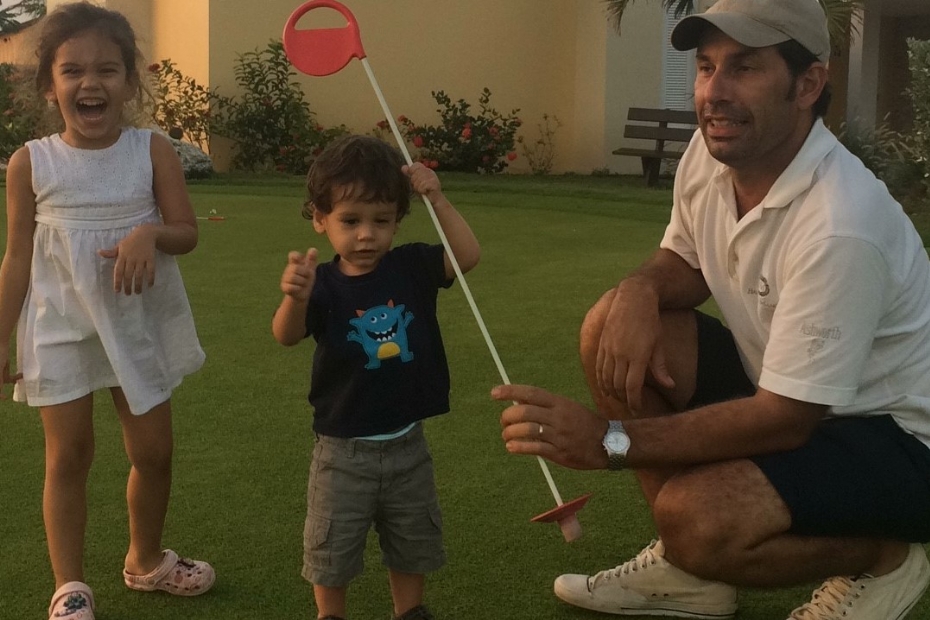Greenkeeping in the tropics: combination of heat, wind and salty air is the biggest challenge |
|
|
|
|
 |
| 178 sec |
Sheltered by palm trees and surrounded by azure bays, Blue Bay Golf & Beach Resort is an 18-hole resort course on the southwest coast of Curaçao. Considered the best course on the island, it requires precise management due to the dry climate and seaside location. Superintendent Alfredo González leads an international team dedicated to maintaining the 64-hectare property. "You don't tame the grass here — you have to understand it."
 |
Alfredo González is originally from Argentina, where he first encountered golf course management during his agronomy studies. "I worked at a golf course part-time while studying and became fascinated by the technical and biological aspects of turf management." His interest took him to Ohio State University, where he specialized in turfgrass management. From there, things moved quickly: González worked as a superintendent on courses in the United States, Germany, Spain, Morocco, and Scotland. "Every climate teaches you something new," he says. "But Curaçao is truly unique." Working at Blue Bay — a course designed by Rocky Roquemore — felt like a natural next step. "A resort course in a tropical climate, with direct sea access and low rainfall. These conditions demand tailored solutions and continuous expertise."
dealing with heat, salt, and scarcity
Curaçao's climate is semi-arid, with average temperatures ranging from 28 to 32 degrees Celsius and little rainfall. Additionally, the course lies directly on the coast, which affects soil quality and water management. "The biggest challenge is the combination of heat, wind, and salty air. Traditional grass varieties don't survive here. That's why we mainly use Paspalum, a naturally salt- and drought-tolerant species." Water quality is another focus. "We use treated, purified wastewater for irrigation. That requires careful coordination with nutrients, or else you disrupt the soil life or stress the grass." Over the past five years, the entire irrigation system has been renewed, including the installation of 1,000 Rain Bird IC sprinklers. "This system gives us a lot of control: we can water each sprinkler individually, depending on need and wind direction."
sustainability as a guiding principle
According to González, sustainable management isn't a trend — it's a necessity. "On an island like Curaçao, you're constantly aware of scarcity. Water, energy, space — everything must be used efficiently." Blue Bay now operates entirely without pesticides. "We've deliberately chosen zero use. That means more manual labor, but it pays off. Biodiversity is visibly increasing." That choice has benefits both ecologically and socially. "Around our lakes and in the natural zones, we're seeing more and more bird species returning. We've now recorded over 200 species, including many migratory birds. That's unique for a resort golf course."
skilled and dedicated team
Daily maintenance of the course is carried out by a team of twenty employees, ranging from greenkeepers to irrigation technicians and a mechanical supervisor. "Everyone has a clear task, but we work as one team. That's essential, because in this climate you have to be able to respond quickly." Most coordination is verbal. "We start every day with a field walk and then divide the tasks. We constantly monitor turf condition, water distribution, mechanical maintenance, and playing quality." González sees team development as a vital part of his job. "We do a lot of in-house training. Technical knowledge, but also timing and attention to detail are essential in this field."
|
|
"Our guests are used to quality and comfort. They want to play on a course that's in perfect shape, even while on holiday."
| |
|
tourism
Blue Bay is not just a golf course but part of a larger resort, which raises expectations. "Our guests are used to quality and comfort. They want to play on a course that's in perfect shape, even while on holiday." Occupancy is seasonal. "It's busiest here from October to April, with peaks in December and January. We host golfers from the Netherlands, the U.S., Canada, and Colombia." The local membership is also growing. "We have a loyal group of regular players who are very engaged with the course. We incorporate their feedback into our improvement plans. That's valuable."
|
|
"We want a cohesive look, with planting that suits the climate and also benefits biodiversity."
| |
|
In recent years, major investments have been made in the course's quality. Alongside the irrigation system upgrade and reseeding of greens and tees with Paspalum, much of the landscaping has been redesigned. "We want a cohesive look, with planting that suits the climate and also benefits biodiversity." A new maintenance program is in the pipeline for the coming years. "We'll continue leveling tees, renovating bunkers, and improving our water features. Climate change also forces us to build more resiliently. Think drainage systems that can handle heavy rain and soils that retain moisture better."
limited connection to the Dutch sector
Notably, ties with the Dutch golf sector are limited. "We source most of our products from the United States, because of logistics and availability. Contact with Dutch greenkeepers is also minimal. That's a shame, because I think we could learn a lot from each other, especially in sustainable course management." Still, González remains optimistic about the future. "The conditions are challenging, but that's what makes the work exciting. Every day is different. And when you see the sun rise over hole 6 in the early morning, you know exactly why you're doing it."
This article was originally published on 23 June 2025 on the Greenkeeper website.
| LOG IN
with your email address to respond.
|
|
|
| There are no comments yet. |
|